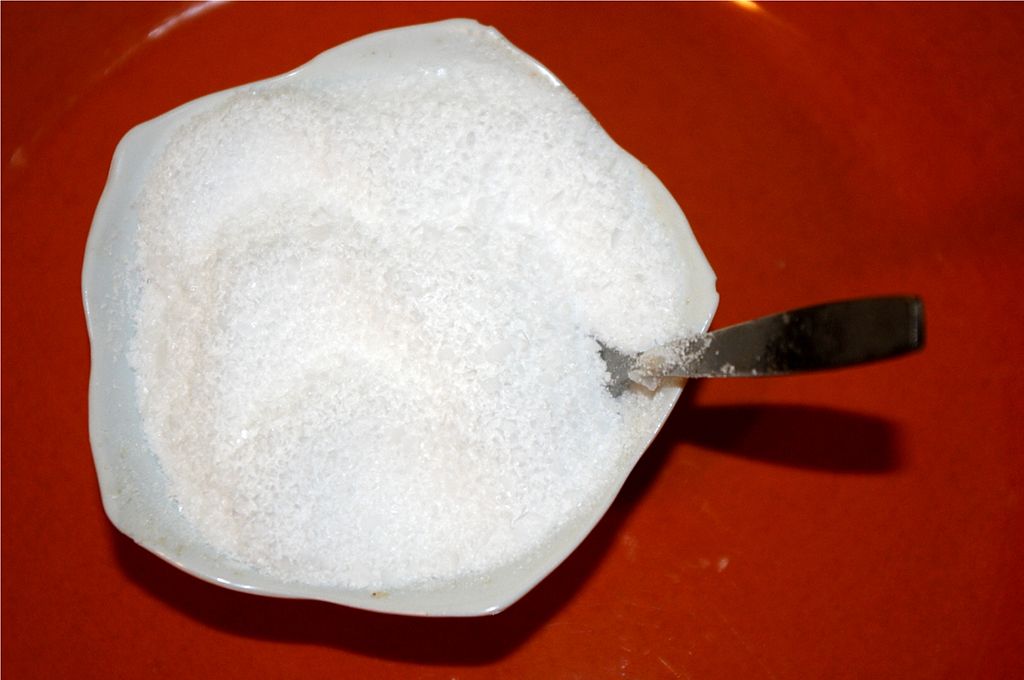What is the Difference Between Kosher Salt and Table Salt
Table of Contents
The key difference between kosher salt and table salt is that kosher salt does not contain additives like iodine, has a coarse texture, and is used only for cooking processes, while table salt has a fine texture with iodinated composition and is used for food seasoning purposes.
The chemical compositions of both kosher salt and table salt are similar. They are different from each other by shape, size, and flavor.
CONTENTS
1. Overview and Key Difference
2. What is Kosher Salt
3. What is Table Salt
4. Kosher Salt vs Table Salt in Tabular Form
5. Summary – Kosher Salt vs Table Salt
What is Kosher Salt?
Kosher salt contains sodium chloride and is free from other additives and added nutrients. These crystal-shaped large grain-sized flakes are used in cooking processes in the kitchen to add flavor for food rather than in giving salty tastes for food. Kosher salt can be found in underground caves in the sea, and it is made by drying saltwater.

The use of kosher salt has remarkably increased in the past few decades. Most possibly, when cooking meat, kosher salt is used in order to remove the blood from the meat. Most restaurant chefs around the world give priority to kosher salt in food making and flavoring procedures. The most common reason for this use is its large crystal size and texture.
What is Table Salt?
Table salt is white salt we see in saltshakers. Fundamentally, table salt adds salty tastes to food when they are on the table. Table salt is specially added for food like French fries, popcorn, and vegetable salads in seasoning. Table salt also contains sodium chloride and is made as small crystal flakes with a smooth texture than kosher salt. Some describe table salt as fine salt due to its constant crystals and fine consistency.

Table salt is also made by drying saltwater after mining underground caves in the sea. Iodine, which has the healing power for the thyroid, is also added to table salt. Nevertheless, if needed, iodine-free table salt can also be found in the market today as customer preferences.
What is the Difference Between Kosher Salt and Table Salt?
The chemical composition of both kosher salt and table salt is similar. They are distinct from each other through their shape, size, and flavor. Although both salts are used in food savoring processes, kosher salt is used in the cooking process in the kitchen, whereas table salt is used in seasoning food on the table. Any salt cannot be identified as healthier than the other salt since the nutrient composition is equal. However, the key difference between kosher salt and table salt is that the kosher salt has a bristly texture, whereas table salt has a fine and smooth texture. That is the only visible variance in the two types of salt.
The other main difference between kosher salt and table salt is that table salt is invigorated with iodine, whereas kosher salt is not revitalized with any other nutrients or additives. All salt is refined from saltwater, and the nutrient composition and chemical composition are also quite similar. All the differences basically emerge from the different brands in the market.
The following table summarizes the difference between kosher salt and table salt.
Summary – Kosher Salt vs Table Salt
Salt is used in food flavoring processes. The key difference between kosher salt and table salt is that kosher salt has its coarse texture without any additives like iodine, whereas table salt consists of a smooth and fine texture revitalized with iodine. Although both types of salt are used as food flavors, kosher salt is used in cooking processes, while table salt is used in seasoning cuisines at the final stage before consumption.
Reference:
1. “Salt.” Wikipedia, Wikimedia Foundation, 26 Oct. 2021.
Image Courtesy:
1. “Kosher Salt” By Glane23 – Own work (CC BY-SA 3.0) via Commons WikimediancG1vNJzZmivp6x7pbXFn5yrnZ6YsqOx07CcnqZemLyue9ahmK1lmah6tbTEZpuinpaav6a6wp5km52krLKmuoykpqyglad6tK3LrWSappRiwaKuy55krJmcqXw%3D